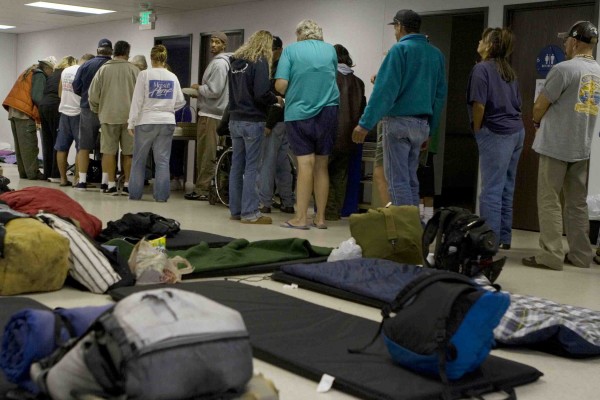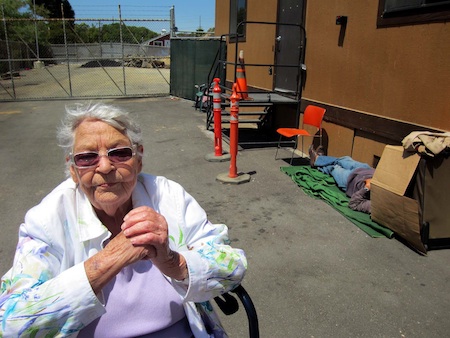
Chronically homeless and diagnosed with depression and alcoholism, Kenneth Glover is one of five plaintiffs in a lawsuit filed against the City of Laguna Beach last week by the American Civil Liberties Union and two attorneys from the firm of Paul Hastings, LLP.
Glover, 47, has made Laguna Beach his home since 2011. But his attempts to find a place to sleep at night have put him on the wrong side of the law.
When he can, Glover beds down in one of the 45 spots at the sleeping shelter for the homeless in Laguna Canyon, which the Friendship Shelter operates for the city. But since he doesn’t have status as a “local,” he only spends the night when he wins the lottery for one of the spots that are left after the regulars have all been accommodated, according to the lawsuit.
When he slept in the shelter’s parking lot after being denied space inside one night, Glover was cited for illegal “lodging” in public under state law when the police discovered him the next morning. On another occasion, he was given a bus pass to a shelter in Fullerton, which was closed when he arrived.
When he did get into the shelter, he found it stressful because of the noise and the nightmares he suffered there. When he didn’t, he had no legal place to sleep, according to the complaint, and sought places to sleep where he could avoid detection by police or residents.
Even so, he was cited three more times, twice for illegally sleeping on the beach and once for illegal “camping.”
The class action lawsuit holds the city responsible for failing to provide chronically homeless, mentally and/or physically disabled individuals like Glover, his co-plaintiffs and others with a suitable place to sleep. The city’s practice of providing limited shelter to the local homeless population, while at the same time harassing those forced to sleep outside because they can’t access the shelter “discriminates against, criminalizes, and endangers disabled, homeless persons and, in so doing, violates their civil rights,” the suit claims.
Laguna Beach City Manager John Pietig said in a statement that the City Council unanimously decided to vigorously defend the city against the lawsuit in the belief its policies and actions comply with the law. He pointed out Laguna provides the only year-round shelter in the county and lamented the ACLU’s suit rather than recognition of the city’s “unparalleled efforts” to help the homeless population.
Claiming violations of the Americans with Disabilities Act, the Rehabilitation Act and the 8th and 14th Amendments to the U.S. Constitution, the lawsuit insists that the only solution for the chronically homeless disabled population is to provide them with permanent supportive housing.
The lawsuit seeks injunctions preventing police from enforcing anti public sleeping and anti-camping laws and requiring the city to provide permanent supportive housing for disabled homeless people.
The lawsuit “shines further light” on the need to solve homelessness through

housing, Dawn Price, executive director of the Friendship Shelter, said in a statement. “Friendship Shelter has long advocated for permanent supportive housing, and while we would not have chosen litigation, we cannot and will not change our position on this important issue,” declared Price.
Indeed, for the last 18 months, the Friendship Shelter has strongly advocated for establishing just such a facility for the chronically homeless with disabling mental conditions at the location of the current sleeping shelter, sandwiched between the dog park and the Pacific Marine Mammal Center.
However, many residents vociferously opposed the project site, as did supporters of the neighboring Pacific Marine Mammal Center, who said its proximity might compromise their funding. And, after extensive negotiations on that project, the City Council decided against it in June.
“It is not yet clear if there is an appropriate site for such a facility in Laguna Beach,” Pietig said in his letter, noting that the Friendship Shelter housed 21 people in permanent supportive housing in southern Orange County since 2014 and has funding for 23 more units that may open later this year.
Asked about the origin of the lawsuit, ACLU attorney Heather Johnson said the organization has been receiving complaints about the treatment of the homeless in Laguna Beach since terms agreed to in a previous 2009 settlement ended.
A lawsuit filed in December 2008 called the city to task for citing homeless individuals for sleeping in public places when they had no viable alternative. In a settlement, the city agreed to repeal laws relating to camping and sleeping in public places. The city subsequently established a sleeping shelter with the idea that as long as the local homeless population was provided with an alternative to sleeping in public, they could resume enforcing laws prohibiting it.
According to an ACLU statement, the city resumed citing homeless individuals for sleeping in public at the end of the three-year settlement period, despite challenges in accessing the shelter, whether for lack of space or because their disabilities precluded it.
The ACLU’s goal is to protect and defend the civil rights of people experiencing homelessness, as well as to push for policy changes to end homelessness, such as providing permanent supportive housing, said Johnson, who formerly worked for National Law Center on Homelessness & Poverty.
That organization recently published a report entitled “No Safe Place: The Criminalization of Homelessness in U.S. Cities,” which calls communities across the country into account for criminalizing homeless people who engage in unavoidable activities such as sleeping or sitting down.
Those practices are designed to remove from downtown areas the visible homelessness that has increased since the economic downturn, Johnson said. And cities typically turn to a law enforcement solution, “which is not effective in the long term,” she said, because people have no way to comply with the laws, which end up criminalizing their status.
“Laguna Beach is not the only city that has taken this approach,” said Johnson.
In fact, as an example of the issue’s national scope, the U.S. Department of Justice on Aug. 6 filed a statement of interest in a lawsuit brought by a group of homeless individuals against the City of Boise, Idaho. The suit opposes the city’s laws against sleeping on city streets.
“Many homeless individuals are unable to secure shelter space because city shelters are over capacity or inaccessible to people with disabilities,” said Principal Deputy Assistant Attorney General Vanita Gupta, head of the Civil Rights Division, in a statement released at the time of the filing. “Criminally prosecuting those individuals for something as innocent as sleeping, when they have no safe, legal place to go, violates their constitutional rights. Moreover, enforcing these ordinances is poor public policy.”
According to an article in the Boise Weekly, city officials there contend that they only enforce the laws when they know there is available space in local shelters.





Maybe they should sue the Obama Administration as their economic policies have lead the increase in poverty and homeless.
Suing the city for failing to PROVIDE shelter??? This is absolute insanity if anyone takes this sentiment even remotely seriously. Who will pay for this shelter and these services? The ACLU obviously has no interest in the civil liberties of the people that are going to be compelled to pay for this. The Friendship Shelter has helped bring this about, and has proven to be a terrible influence on the city. Laguna Beach is the worst location for an expanded homeless shelter for a whole host of reasons. This is a shameless attempt at a money-grab by the Friendship Shelter and the ACLU. They have no interest in reducing homelessness in the city–they just want to expand their organization and have an utter disdain for the citizens.
My question is simple…why do they choose to stay in laguna beach when they know there is no place for them. There are other winderfy leaders communities in the area…laguna niguel, Dana point, Newport Beach, corona deal mar.
Being a resident here for the last few years I have taken mote that Laguna Beach does a lot for people who are economically disadvantaged. Housing, psychological support , distribution of food, medical services at the health clinic etc.
My question is why aren’t u other communities being called out?
So what happens if we comply with the ACLU? Build a Montage for the homeless, complete with doctors, psychologists, chef, and personal trainers. Word gets out that Laguna Beach is the place to be home homeless in, and this shelter now fills up? ACLU brings upon another lawsuit? At some point it has to stop. It’s simply not sustainable.
I hope our City Officials fight this nonsense with every available resource. The Friendship Shelter and Dawn Price have the most to gain from this litigation. Especially after the City Council listened to the residents and voted to oppose the building of a large apartment in the canyon..
These “supportive housing” facilities do not require inhabitants to remain sober for privileges. Yet working americans are routinely drug tested to acquire a job or to retain their employment.
Why are only responsible people held accountable for obeying laws? Homeless routinely litter our beaches, urinate and public intoxication in public spaces and involved in much petition crime
.
Disabled people collect more in government subsidies and it is a known successful “business” model to rent “permanent supportive housing” to disabled by confiscating government checks to pay the “rent’ for these apartments.
The homeless should demonstrate gratitude for the many services provided by this city and the tax paying residents. Another disappointing case of ungrateful entitlement.
[…] LAGUNA BEACH ACLU MOVES; SANTA CRUZ DOESN’T Meanwhile in Laguna Beach, the ACLU there has filed suit against the city for sleeping bans that criminalized disabled people–as Santa Cruz’s ban does to folks outside here. See http://www.lagunabeachindy.com/updated-aclu-again-targets-citys-homeless-policies-2/ […]
KIds, kids, kids! This is why we can’t have nice things. First, take the time to understand the years-long lead-in to and the reasons behind this action taken by the ACLU – which, incidentally, was NOT initiated by Friendship Shelter, which some find it convenient to assume.
Then pay a visit to the Alternative Sleeping Location (ASL) at 20652 Laguna Canyon Road and see for yourself the luxurious accommodations the city has offered its disabled, chronically homeless people.
The Friendship Shelter does what it can at the ASL to the extent the city allows, with overnight accommodations, minimal services (dictated by the city), and meals provided by volunteer groups and nonprofits. FS has tried unsuccessfully for years to convince the city government to do what needs to be done: to move on a proven solution it pretends does not exist….the last of the 14 recommendations made by the CIty Homelessness Task Force formed a decade or so ago to research the situation and come up with answers… the one action they can take to better the quality of life for everyone in the community. This magical solution to homelessness? Drumroll….it’s housing. Supportive housing: a) literally save people’s lives by getting them indoors and stabilized, b) COSTS FAR LESS than what the city continues to throw annually at the “problem.”
Here’s attribution in case anyone’s keen on facts and data:
1) http://www.endhomelessness.org/pages/cost_of_homelessness
2) HUD Secretary Shaun Donovan on The Daily Show, March 5, 2012: “It costs, between shelters and emergency rooms, emergency response team services, and jails, about $40,000 a year for a homeless person to be on the streets.”
3) Cost of supportive housing: about $27,000 including housing and all services – see the helpful graphic at http://www.endhomelessness.org/library/entry/supportive-housing-is-cost-effective
Individualized, appropriate attention can be given to each person with the establishment of a single, multi-unit, supportive housing structure IN LAGUNA BEACH that will be much better than what we have now: a parking lot with no bathrooms and no running water where at least a dozen or more people are living full-time during the day. In 2014, 400-plus individuals spent at least one night at the ASL, with 28 of those individuals using nearly HALF of the available “bed” nights over the course of the year. (and to be clear, by bed we mean a three-inch-thick mat on the floor 5 inches from the next person who may be coughing, puking, moaning in his sleep, etc.).
If you are worried about the unwashed thousands tramping their way to Laguna Beach once they catch wind of all the free apartments we’re handing out, please stop. Just stop. Homelessness is a complicated problem. It’s not like feeding pigeons or stray dogs, that if you start, “they all come swarming.” That is both an ignorant and mean-spirited assumption, but one that works to great advantage by fearmongers like a certain longtime member of our city council and our city manager. These are people, each with a different story about how and why they came to be homeless. People live in a community, whether housed or not. As they have for many decades, there are those who come and then go after an average stay of 3 to 4 days, but if you live here, you probably know who our chronically homeless people are. They live pretty much full-time outdoors at 20652 LCR and they have no bathrooms or access to running water. In a community often praised for its caring, close-knit nature, this the best our city government can do? Because people are judged to be undeserving due to their circumstances and disabilities, the city disregards their real needs, willfully ignores the obvious answer, shines on the established, respected nonprofit offering to take it on and carry it out, then pats itself on the back for all it’s done? Please.
The city needs to quit the “Poor us, we do so much already!” game. They know that they have only done half the job at more than twice the expense. Other Orange County cities (Fullerton, Anaheim) are stepping up and implementing supportive housing not because it’s the right thing to do. They have taken the emotion out of it and looked at the information: it works and it’s cost-effective.
Get the facts. You might just see how it benefits EVERYONE in Laguna Beach to stop spending stupid money and start spending it smart on permanent housing. There are some sharp people in town who can figure this out – and there is HUD money to help.
[…] Hastings, caped as the ACLU, have our town in their crosshairs with a freshly filed lawsuit (“ACLU Again Target’s City’s Homeless Policies,” August […]
[…] lawsuit, the second filed in six years by the ACLU, alleges that the city’s policies toward the homeless are discriminatory and violations of civil […]
[…] as the Alternative Sleeping Location. The objections he voiced are also spelled out in a second lawsuit filed by the ACLU in August against the city of Laguna […]
[…] suit contends that because Laguna’s year-round overnight shelter lacks adequate capacity, disabled […]
[…] another year, said Pietig, would be preferred due to a pending lawsuit with the American Civil Liberties Union, which was filed last August on behalf of five homeless […]
[…] ruling, issued Monday, Oct. 3, Guildford supported class certification, which would allow the suit filed in August 2015 to proceed against Laguna Beach. The hearing allowed lawyers for both sides to reply […]